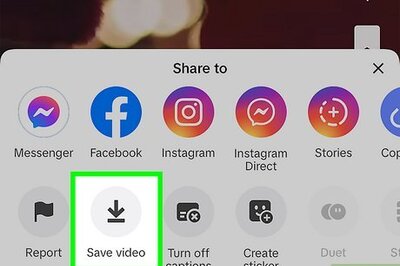
views
Listening to the Music

Listen to the album multiple times. With every listen, new insights and observations should occur to you. If on the first listen you focused on lyrics or melody, try to stretch yourself to notice something different the next time and the time after. The album took a lot longer to make than it will take to listen to it, so try and respect the effort of the artists and appreciate the complexity.

Listen in different places at different times. Try to bring the music with you as you go about your day. Let it play while you’re working out or doing chores around the house. You may notice things when it’s on in the background that you didn’t notice when you were intently listening - music is funny that way!

Familiarize yourself with musical terms. To best qualify, your assessment of the music, do a quick internet search for musical terms, and then try to incorporate them into your review when applicable. Here are a few examples of musical terms that could show up in a review: Beat (the regular rhythmic pattern of the music) Crescendo (growing or becoming louder) Harmony (the simultaneous sounding of two or more notes, as in a vocal harmony) Tempo (the speed the music is played)

Write your initial reactions down. Describe how the music makes you feel, whether the album flows from song to song or if it sounds like each song stands on its own. Jot down any poignant or super catchy lyrics. Use these insights later, when you’re adding detail to your review.

Notice what stands out. If an instrument gets featured more than others, or if the guitar riffs are especially prolific, make a note. Identify your favorite songs and lyrics and the ones that seem to be the most catchy or emotional.
Outlining Your Review

Research the artist and compile interesting facts. Focus on where they grew up, what their musical influences were, how they were discovered or broke into the music business, and what their future goals are. Try to include information that helps the reader understand the meaning behind the album. A recent breakup or the loss of a family member is worth mentioning if it influenced the tone of the album.

Describe how this album relates to past albums or similar artists. If the band has released previous albums, describe how this album fits in and if it sounds different or shows progress. If this is the band’s first album, describe how it relates to other albums in the genre. Note if the artist or band is progressive, or very similar to other artists in the genre.

Read other album reviews. The National Public Radio’s website, Rolling Stone magazine’s website, and the Pitchfork website are all great, free resources. These will give you a sense of structure and ideas for descriptive words and themes you might look for to expand your review.
Structuring Your Review

Introduce the artist and the album succinctly. Your introduction should be more substance than fluff, and it should also catch the reader’s attention. They should be able to tell from your introduction whether you liked the album or not and what stood out. Include the album release date. For example: “The Pipe Cleaners debut album, This is Futile, was released August 1st, 2017. Since then, it’s received critical acclaim and sold more than 1,000,000 copies. Even though the vocals seem to get lost in the loud instrumental solos and rushed tempos, the album shines as a modern throwback to classic hair metal.”

Describe the artist and their history. Use your outline and the facts you gathered during your research. This is a great place to mention their previous work, if any, and whether any events influenced the album. For example: “Originally formed in Denver, Colorado, The Pipe Cleaners feature William Uling on vocals, Sarah Uling on guitar, Matt Stein on bass, and Dirk Golding on drums. The Pipe Cleaners went through several drummers before settling on Golding and starting work on their first studio album. Before it was finished, legendary rock producer Brandon Wicks caught a live performance and signed the band to his label, Candle Wicks. He and Nick Paul share executive producer credits. During recording, William and Sarah Uling lost their mother, Patty Uling to cancer.”

Describe the meaning and mood of the album. Look for emotional themes, such as empowerment, freedom, and loss. The mood can be discerned from the lyrics and melodies, and how they make you feel upon listening. For example: “The frequent references to death, specifically in the songs “You’re Still Gone” and “When I Close My Eyes” set a dark, but the hopeful mood on this ambitious debut album. In the piercing ballad, “I Could Have Been,” the major themes of the album all come together, which seem to be death, rebirth, and regret.”

Include emotive words and lyrical details. Try your best to describe the instruments, the melodies, and the lyrics by citing specific examples and referencing the actual lyrics in your review. For example: “The lyrics, “This is painful, it’s so shameful, how much I don’t want to care,” from the song, “Give it Up,” shed light on the struggle to deal with Patty’s death. The haunting guitar riffs on, “So This Means Nothing,” and the harmony between the lead vocalist and backup vocalist Matt Stein on, “Say You Will,” were surprising and moving.”

Write about what the band is doing next. If the album you are reviewing is from a band or artist that is still active, talk about their plans. If they’re going to go on tour, tell your readers when. For example: “The Pipe Cleaners will be going on a U.S. tour with Melvin and the Marauders starting September 25th, 2017. Seattle, Portland, Austin, Denver, Atlanta, Chicago, New York City, and Miami are included in the 23 stops. After the tour finishes on October 31st in Los Angeles, the band will be collaborating with Brandon Wicks and Shawn Snyder on their next album, which will have a decidedly different feel. According to Nick Golding, we can even expect some country flair.”

End with a recap. Concisely summarize the more important points in your review. Touch on how the album made you feel, and whether it was worth listening to, and why. For example: “After everything they’ve been through over the last two years, The Pipe Cleaners let it all hang out on this raucous, up-tempo, and fresh LP. The ballads set a high note for vocals, the guitar riffs and solos were unplayable for the average musician and therefore incredible and complex, and the lyrics shine across every song. I’ll be looking forward to seeing them perform this fall on their tour and to hearing what they do with their next album.”
Avoiding Common Mistakes

Proofread the review and ask for feedback. You’ll want to fix any spelling or grammar errors, and sentences or ideas that don’t make sense or aren’t developed. If you get questions, especially the same questions from multiple people, it might be worth answering those in the review.

Write critically, but never cruelly. If you didn’t like something about the album, or maybe even the entire thing, provide examples and stay professional in your tone. “The album was terrible,” isn’t constructive or polite. Stick to the facts and use examples like, “The vocals were off-key and the pitch was a little grating,” or, “The instruments were out of sync with each other and it was difficult to understand the vocalist.”

Choose quality over quantity with your word count. Unless you have a specific word count requirement, don’t feel as though your review needs to be lengthy at the expense of substance. If you can accomplish a review that summarizes the album and honors the many layers and ideas it conveys in a few paragraphs, that’s great!



















Comments
0 comment